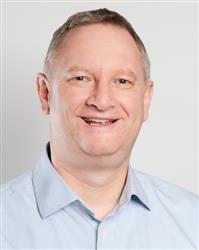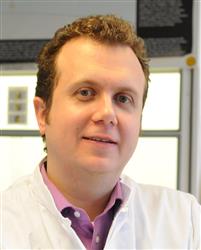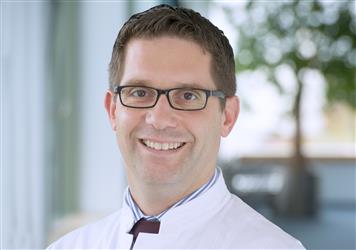ProjektMultiscaleHCC: Diagnose und Therapie des hepatozellulären Karzinoms (HCC) unter Einbeziehung von Omics-Methoden…
Grunddaten
Titel:
MultiscaleHCC: Diagnose und Therapie des hepatozellulären Karzinoms (HCC) unter Einbeziehung von Omics-Methoden (Metabolomics, Proteomics), der multiparametrischen Bildgebung und Methoden der Systemmodellierung
Laufzeit:
01.05.2017 bis 30.04.2019
Abstract / Kurz- beschreibung:
Das Vorhaben der Uni Tübingen beschäftigt sich mit der Diagnose und Therapie des hepatozellulären Karzinoms (HCC, Lebertumor) unter Einbeziehung von Omics-Methoden (Metabolom und Proteom als molekulare Parameter des Tumors), der Bildgebung und Methoden der Systemmodellierung. Dabei werden folgende Arbeiten durchgeführt: Erfassung und Auswertung klinischer Daten in Zusammenhang mit radiologisch erstellten Reaktionsmustern („Imaging Fingerprint Profiles") und systembiologisch weiterentwickelten prädiktiven Tumormodellen auf die Therapieverfahren
medikamentöse Therapie durch Sorafenib oder transarterielle Chemoembolisation (TACE) beim Lebertumor. Funktionelles Imaging und molekulares Profiling von genetisch definierten HCCs nach antiangiogenetischer Therapie. Mausmodelle mit Lebertumoren werden nach antiangiogenetischer
Behandlung mittels funktionellem Imaging (PET/MR), metabolomischer Analyse und Transkriptomanalyse
untersucht. Durch integrative Datenanalyse sollen Kandidatengene oder Gen-/ Metabolomsignaturen
ermittelt werden, die prädiktiv für das Tumoransprechen sind. Identifizierte Kandidatengene sollen im
Mausmodell funktionell genetisch validiert werden.
medikamentöse Therapie durch Sorafenib oder transarterielle Chemoembolisation (TACE) beim Lebertumor. Funktionelles Imaging und molekulares Profiling von genetisch definierten HCCs nach antiangiogenetischer Therapie. Mausmodelle mit Lebertumoren werden nach antiangiogenetischer
Behandlung mittels funktionellem Imaging (PET/MR), metabolomischer Analyse und Transkriptomanalyse
untersucht. Durch integrative Datenanalyse sollen Kandidatengene oder Gen-/ Metabolomsignaturen
ermittelt werden, die prädiktiv für das Tumoransprechen sind. Identifizierte Kandidatengene sollen im
Mausmodell funktionell genetisch validiert werden.
Beteiligte Mitarbeiter/innen
Leiter/innen
Medizinische Fakultät
Universität Tübingen
Universität Tübingen
Exzellenzcluster: Individualisierung von Tumortherapien durch molekulare Bildgebung und funktionelle Identifizierung therapeutischer Zielstrukturen (iFIT)
Zentren oder interfakultäre wissenschaftliche Einrichtungen
Zentren oder interfakultäre wissenschaftliche Einrichtungen
Institut für Immunologie
Nichtklinische Institute, Medizinische Fakultät
Nichtklinische Institute, Medizinische Fakultät
Radiologische Universitätsklinik (Department)
Kliniken und klinische Institute, Medizinische Fakultät
Kliniken und klinische Institute, Medizinische Fakultät
Medizinische Fakultät
Universität Tübingen
Universität Tübingen
Exzellenzcluster: Individualisierung von Tumortherapien durch molekulare Bildgebung und funktionelle Identifizierung therapeutischer Zielstrukturen (iFIT)
Zentren oder interfakultäre wissenschaftliche Einrichtungen
Zentren oder interfakultäre wissenschaftliche Einrichtungen
Medizinische Fakultät
Universität Tübingen
Universität Tübingen
Exzellenzcluster: Individualisierung von Tumortherapien durch molekulare Bildgebung und funktionelle Identifizierung therapeutischer Zielstrukturen (iFIT)
Zentren oder interfakultäre wissenschaftliche Einrichtungen
Zentren oder interfakultäre wissenschaftliche Einrichtungen
Ansprechpartner/innen
Medizinische Fakultät
Universität Tübingen
Universität Tübingen
Exzellenzcluster: Individualisierung von Tumortherapien durch molekulare Bildgebung und funktionelle Identifizierung therapeutischer Zielstrukturen (iFIT)
Zentren oder interfakultäre wissenschaftliche Einrichtungen
Zentren oder interfakultäre wissenschaftliche Einrichtungen
Lokale Einrichtungen
Abteilung Präklinische Bildgebung und Radiopharmazie
Radiologische Universitätsklinik (Department)
Kliniken und klinische Institute, Medizinische Fakultät
Kliniken und klinische Institute, Medizinische Fakultät
Abteilung Diagnostische und Interventionelle Radiologie
Radiologische Universitätsklinik (Department)
Kliniken und klinische Institute, Medizinische Fakultät
Kliniken und klinische Institute, Medizinische Fakultät
Abteilung Nuklearmedizin und Klinische Molekulare Bildgebung
Radiologische Universitätsklinik (Department)
Kliniken und klinische Institute, Medizinische Fakultät
Kliniken und klinische Institute, Medizinische Fakultät
Abteilung Innere Medizin I
Medizinische Universitätsklinik und Poliklinik (Department)
Kliniken und klinische Institute, Medizinische Fakultät
Kliniken und klinische Institute, Medizinische Fakultät
Geldgeber
Köln, Nordrhein-Westfalen, Deutschland




